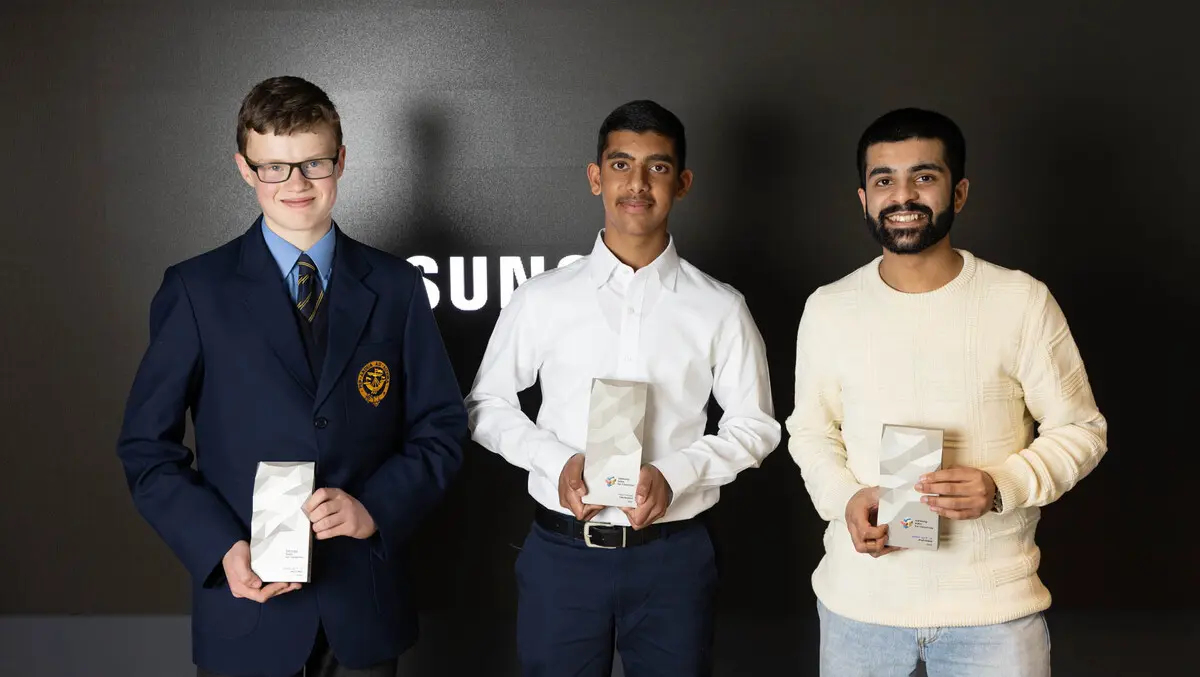
Young Australians awarded for innovative STEM & AI solutions
Winners of the 2025 Solve for Tomorrow competition have been announced, recognising young Australians who have used STEM, AI, and creativity to tackle current societal issues.
Melbourne resident Faiz Noorani, aged 15, received the Major Prize for his project, Access Lens. This AI-powered solution utilises augmented reality to enhance real-time Auslan (Australian Sign Language) translation, aiming to support Deaf and hard of hearing Australians in everyday situations.
Access Lens is designed to translate spoken English into Auslan signs via smart glasses or the camera on a smartphone. The intent is to help users engage more confidently and feel included during daily interactions. Realising a lack of accessible Auslan learning tools, Faiz was motivated to expand the concept into an educational platform that provides interactive, self-paced lessons.
To ensure greater accessibility, Access Lens is intended to run locally, thereby avoiding delays, additional cloud service costs, and advertising. There is also potential for the solution to be subsidised, with the aim of bringing it to more members of the community. The application serves both as a communication tool and an educational resource, addressing a significant gap in inclusive technology for Deaf and hard of hearing Australians.
Faiz said, "Winning Samsung's Solve for Tomorrow competition is something I'm very proud of. The idea came from seeing a friend who is partly deaf, struggle to communicate in class, and it made me think about how many people face similar challenges every day. I wanted to create something that could help break down those barriers and make communication fairer and more accessible. It's amazing to see that idea recognised, and it's a reminder that you don't need to have everything figured out to start-you just need a bit of curiosity and the drive to keep learning."
The Major Prize comes with AUD $10,000, which Faiz plans to use to further develop Access Lens, adding new features, increasing its reach, and forming strategic partnerships for sustainable implementation and impact.
Runner-up awards
The competition's 'Runner-Up 19-24' prize was awarded to Ahan Khiani, 22, also from Melbourne, for his project Team Up. This mobile application is intended to support adults in staying active and socially connected through sport. Recognising the challenges in finding teammates and casual games after leaving school or university, Team Up uses AI to match users with local teams, casual games, and other players based on a range of criteria including sport preferences, location, skill level, and availability.
The app is also designed to assist community teams in finding extra players, contributing to stronger grassroots sporting networks. There are plans to pilot the application in local venues and expand its use through partnerships, with the aim of removing participation barriers and promoting long-term involvement in sport.
Ahan said, "Sport should be one of the most inclusive parts of our week, but I saw how quickly participation drops when teams are short of players or games are cancelled. That experience-and the data-led me to create Team Up, a simple web app that helps clubs and players connect so more people can stay active and involved. Being recognised through Samsung's Solve for Tomorrow competition is a powerful reminder that young people's ideas can drive real change when given the right support. Starting was the hardest part, but by staying curious and learning through doing, I've seen how technology like AI and STEM can help build stronger, more connected communities."
In the 14-18 age group, NSW-based Jack Lowe received the 'Runner-Up' prize for his platform, Eilik, which uses AI to identify potential academic dishonesty in educational settings. Eilik analyses a student's historic academic performance across different subjects to estimate expected outcomes and flags significant irregularities for teacher review. The project's broader goal is to contribute to fairer learning environments and ensure students receive the support needed to develop fundamental skills in areas like science, mathematics, and English.
Jack said, "What started as a school project quickly became something much bigger. I saw how widespread cheating through AI had become and felt it was an issue that needed to be addressed. Over the past few months, I've taught myself Python and built a solution from the ground up, which showed me how powerful technology can be when it's used to solve real problems. I'm proud to be recognised as one of the winners of Samsung's Solve for Tomorrow competition. For anyone thinking about getting into STEM or AI - stick with it. It's not always easy, but the effort you put in can lead to something genuinely meaningful"
The three winners each received a Samsung 'Productivity Pack', comprising a Galaxy Z Flip7 or Galaxy A56, Smart Monitor M70D, and Galaxy Buds3.
Industry views
Brett Turnbull, Director of Corporate Marketing at Samsung Electronics Australia, said, Programmes such as Samsung's Solve for Tomorrow are more than competitions - they're a launchpad for the problem solvers and innovators our future depends on. By backing young Australians with the skills and support to explore STEM and AI capabilities, we're helping to shape a pipeline of talent ready to drive progress and make a real change, both in their communities and future industries."
Dr Kirsten Banks, Astrophysicist, STEM advocate and Solve for Tomorrow 2025 Ambassador, said, "Each year, I'm impressed by the depth of thinking and creativity shown by young Australians using STEM and AI to address real-world issues. The 2025 entries show just how powerful technology can be when paired with empathy and purpose. It's inspiring to see these ideas not only tackle complex challenges, but also reflect a deep commitment to inclusion, education, and community impact."
Now in its 15th year globally, the Solve for Tomorrow program introduced new themes in 2025, including Technology for Sustainability and Social Change through Sports, while continuing its focus on Diversity, Equity and Inclusion, and Education. The competition continues to connect education and industry, providing opportunities for Australian youth to apply STEM and AI to critical societal challenges.


